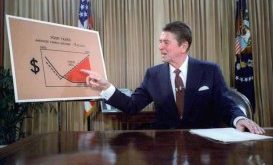This paper introduces the notion of monetary disorder. The underlying theory rests on a twin circuits view of the macro economy. The idea of monetary disorder has relevance for understanding the experience and consequences of the recent decade-long period of monetized large budget deficits and ultra-easy monetary policy. Current policy rests on Keynesian logic whereby […]
Read More »Economics and ideology
from Lars Syll Mainstream (neoclassical) economics has always put a strong emphasis on the positivist conception of the discipline, characterizing economists and their views as objective, unbiased, and non-ideological … Acknowledging that ideology resides quite comfortably in our economics departments would have huge intellectual implications, both theoretical and practical. In spite (or because?) of that, the matter has never been directly subjected to empirical scrutiny. In a recent...
Read More »The big one
Government shutdowns, and threats of shutdown, have become routine in the US, with the result that no one much worries about them any more. Typically some kind of compromise is reached just as the deadline approaches, and government returns to quasi-normality.. Occasionally, bluffs are called and a ‘shutdown’ actually happens. Civil servants are sent home, public facilities are closed and so on. But the armed forces operate as normal, Social Security checks go out, and IOUs take the...
Read More »Andreesen at bay
from Peter Radford The machine makers are restless! There’s quite a debate going on about something called “techno-optimism” which roughly translates as anything technological is good and will, inevitably, make us all much better off. That it makes fortunes for its owners is of secondary importance. The debate has emerged as a result of the publication of Marc Andreesen’s ‘Techno-Optimist Manifesto’, a strange and rather long paean to the many virtues of technology and the much more...
Read More »Fighting billionaires’ control of the media, individual news vouchers
from Dean Baker Mark Twain famously quipped that everyone always talks about the weather, but no one ever does anything about it. (This was before global warming.) In the same vein, it is common for people to rant about billionaires, like Rupert Murdoch and Elon Musk, controlling major media outlets and using them to advance their political whims. But, no one seems to do anything about it. There is a reason for inaction. For the foreseeable future, it is hard to envision a political...
Read More »Retrofuturism
(Crosspost from my Substack blog, where post includes links and images)> I don’t think I’m the only one to notice that Marc Andreesen’s ‘Techno-Optimist Manifesto’ has a curiously dated feel, as if the author had been cryogenically frozen around the time he cashed out of Netscape. Two points particularly struck me. First, there his paean to market processes, which are represented as “Willing buyer meets willing seller, a price is struck, both sides benefit from the exchange or...
Read More »Mainstream economics — a methodological strait-jacket
Jamie Morgan: To a member of the public it must seem weird that it is possible to state, as you do, such fundamental criticism of an entire field of study. The perplexing issue from a third party point of view is how do we reconcile good intention (or at least legitimate sense of self as a scholar), and power and influence in the world with error, failure and falsity in some primary sense; given that the primary problem is methodological, the issues seem to extend in different ways from...
Read More »Στη μνήμη του Aleksandr Vladimirovich Buzgalin
Με μεγάλη λύπη έμαθα για τον πρόσφατο ξαφνικό θάνατο του Aleksandr Buzgalin. Μόλις πριν από λίγες εβδομάδες συζητούσε ζωηρά για τη Μαρξιστική Πολιτική Οικονομία στο πρόσφατο φόρουμ της Παγκόσμιας Ένωσης Πολιτικής Οικονομίας και σχεδίαζε δυναμικά τη μελλοντική πορεία. Ζεστός και εξαιρετικά ευγενικός και ταυτόχρονα πνευματώδης και αταλάντευτος στις απόψεις του, ο Aleksandr είχε μια εμπνευσμένη παρουσία σε όλα τα διεθνή φόρουμ που τον έχω συναντήσει. Ο θάνατός του είναι μια μεγάλη...
Read More »Alexander Vladimirovich Buzgalin: In memoriam
Alexander Vladimirovich Buzgalin: In memoriam It is with great sorrow that I learned about the recent sudden death of Aleksandr Buzgalin. Just a few weeks ago he was vibrantly discussing Marxist Political Economy at the recent forum of the World Association of Political Economy and energetically planning the way forward. Warm and extremely polite and at the same time witty and unwavering in his views, Aleksandr had an inspiring presence in all international fora that I have met...
Read More »It’s good the High Court overturned Victoria’s questionable EV tax. But there’s a sting in the tail
My latest in the Conversation. I’m linking to my Blogstack, please advise if this works for you. Share this:Like this:Like Loading...
Read More » Heterodox
Heterodox


